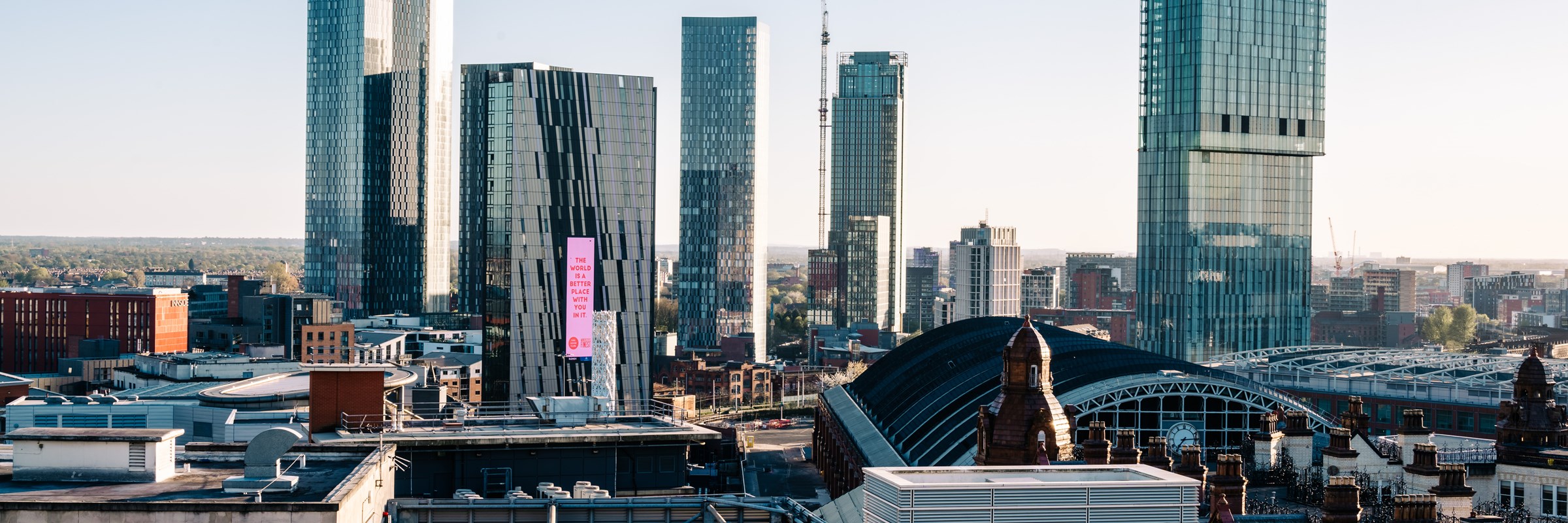
Mayors head to Parliament with plan for Northern Arc to deliver green growth
- Andy Burnham and Steve Rotheram take case for backing Northern Arc to Treasury – as new data shows North can drive green growth and unlock £90bn for UK economy
- Greater Manchester and Liverpool City Region Mayors will meet with ministers and MPs today (Tuesday 29 April), and Andy Burnham will give evidence at Business and Trade Select Committee on the UK's industrial strategy
- Economic analysis shows that investing in transport infrastructure and a pipeline of projects across the North would benefit the whole UK economy, improving living standards and closing the North-South productivity gap
- Mayors will also address Innovation Zero World Congress in London, showing how city-regions can create high quality jobs by pioneering low-carbon innovation
Andy Burnham and Steve Rotheram are taking their vision for a Northern Arc to Parliament today, as analysis shows its potential to drive low-carbon growth and unlock a £90 billion boost to the economy.
The Greater Manchester and Liverpool City Region Mayors are meeting Treasury ministers and MPs to call on them to back the proposals, which would help scale-up key net-zero growth sectors across the North.
The Mayors will address the Innovation Zero World Congress in London, the UK’s largest net zero event, to talk about how city-regions can pioneer low-carbon innovation and deliver green economic growth.
The right investment would create a growth corridor, stretching from the Mersey to the Pennines and connecting into West and South Yorkshire, underpinned by transport networks that would include a new railway linking Liverpool and Manchester.
The Northern Arc area spans regions with close economic ties to Lancashire, North Wales, Hull and the North East. With international connections through the Port of Liverpool and Manchester Airport, it’s well positioned for global trade.
Analysis from Metro Dynamics suggests that new infrastructure investment can turbocharge economic output by £90 billion in the next 15 years, complementing the £78 billion generated by 2035 by plans for an Oxford-Cambridge Arc in the South.
The study also shows how the Northern Arc can connect key high-value growth sectors across the North to drive wider prosperity.
This includes major new clean energy and decarbonisation projects – like the Mersey tidal barrage and the HyNet network, which would support carbon capture from heavy industry and provide locally produced low-carbon hydrogen to homes, businesses, and transport.
As well as clean energy, the Northern Arc also connects strong areas of innovation in AI and cyber, life sciences, and advanced materials and manufacturing – ranging from Greater Manchester’s Atom Valley, with the potential to create 20,000 jobs and 7,000 new homes, to Liverpool City Region’s Life Sciences Innovation Zone, which is expected to attract up to £800m investment to the Liverpool City Region, creating 8,000 jobs over the next 10 years.
Mayor of Greater Manchester Andy Burnham said:
“The Northern Arc is an idea whose time is long overdue.
“Governments of the past 20 years have come to the same conclusion: that backing the North can deliver transformative growth for the whole country. Sadly, the big investment we need in transport infrastructure has fallen short, time and again.
“Despite that, the North West has powered ahead – and Greater Manchester has grown faster than the UK economy. But we’re in danger of being stopped in our tracks without a modern transport network to handle that growth.
"The Northern Arc can be the fast-track to green growth. With new investment we can connect crucial low-carbon energy schemes across the North, from Mersey tidal power to the HyNet project – powering thousands of new net-zero homes and helping the UK hit its 2050 target.
"This isn’t even a question of fairness – it's one of good economic sense. If the whole country is to get the green growth that it needs, the North of England is where to look – because it’s where that growth can be delivered.”
Mayor of the Liverpool City Region Steve Rotheram said:
“The North has always been a place of innovation, industry, and immense potential – but for too long, we’ve been held back by a lack of investment in the infrastructure needed to match our ambition. The Northern Arc is about changing that story. It’s about unlocking the talents of our people, powering our communities with clean energy, and connecting opportunity across our towns and cities.
“Two centuries ago, the Liverpool-Manchester Railway showed the world how the North West could lead the way in connecting people and powering growth. Today, we have the same chance to shape the industries of tomorrow – with transformational projects like Mersey Tidal Power and HyNet, and with new transport links to match.
“By working in partnership with government, businesses and civic leaders, we can help deliver the growth the country needs to succeed. Investing in the North isn’t just good for us – it’s the catalyst for a stronger, fairer, and greener economy for the whole of the UK.”
In 2019, the Liverpool City Region Combined Authority became the first in the country to formally declare a climate emergency, with its five-year Climate Action Plans including retrofitting tens of thousands of homes, decarbonising public buildings, greener public transport and green energy, aiming for Net Zero by 2035 or sooner. The city of Liverpool is the world’s first UN Accelerator City for climate action, recognising its commitment to trial innovative new ways to rapidly decarbonise the live music and TV/Film production sectors.
Greater Manchester’s Five-Year Environment Plan sets out how the city-region will build 30,000 new affordable net-zero homes, reduce emissions across the Bee Network, and stimulate growth in clean sectors while connecting young people with jobs and training in the green economy.
The North West section of the Northern Arc, encompassing the Liverpool City Region, Cheshire and Warrington, and Greater Manchester, covers an area home to 5.4 million people, two Investment Zones, and an annual economic output of £150 billion.
Article Published: 29/04/2025 12:04 PM


